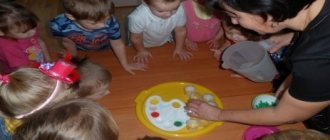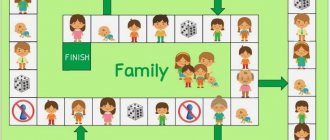Methodological recommendations for teaching English to preschool children
Tatiana Chernyshkova
Methodological recommendations for teaching English to preschool children
Learning English should start from an early age. Learning a foreign language , if classes are properly organized, develops children and raises their educational and cultural level. Thus, as a result of an experiment conducted in schools in England and Wales, involving 6,000 children , it was found that foreign language have a positive effect on knowledge of their native language; many children with weak general abilities showed excellent success in speaking a foreign language . Research from leading universities in the US and Canada has shown that bilingual children develop better cognitive abilities than monolinguals. The beneficial effect of learning a second language on the development of native speech was proven by L. S. Vygotsky, noted by L. V. Shcherba, and other domestic scientists. Long-term experimental teaching of a foreign language , carried out by the staff of the laboratory for teaching foreign languages at the Research Institute of General and Secondary Education of the Academy of Pedagogical Sciences of the Russian Federation, confirmed the “beneficial influence of the subject on children : on their general mental development (memory, attention, imagination, thinking, on the development in children of ways of adequate behavior in various life situations, for better command of the native language , for the speech development of children in general ." The sooner you start introducing a child to the English language environment , the better. Thus, during the first 4 years of a person’s life, 50% of cognitive abilities are developed, by the age of 7-8, basic skills are formed. Starting from 8-10 years, any abilities need to be developed through training. The older you are, the more time you will need to devote and more effort to invest. Therefore, the best option for teaching English to children is to start from the age of 4, or even earlier. So, children speak the languages they hear. Thus, introducing learning English will contribute to its rapid grasp. In the future, when the child grows up, spoken English will be reproduced on a subconscious level without an accent, using correct grammar.
Principles for presenting educational material to preschoolers : For classes to be truly effective and not overload the child, they must follow certain principles.
• Voluntary activities. Under no circumstances should a child be forced to learn English at an early age . If lessons become a chore, they can quickly become boring, and subsequently it may be difficult for the child to learn the language . The main task of parents and teachers is to arouse interest in the language , and the game helps well with this. Through play, children explore the world and easily become involved in the process, easily mastering important language skills .
• The child's motivation and interest in lessons. A child does not have the motivation to learn English that adults have. They don't need to build a career, they don't realize that English in the future. Therefore, it is important to interest the child in something else. If he is interested in the learning , if it is fun and tireless, the child himself will strive to study. Come up with your own motivation.
• Child's comfort during learning . Comfort is another important point when learning . Some children easily stay in a group with other children and the teacher, others need one of the parents nearby. It depends on the age of the child and on his character. If the lessons are natural for the child, he will easily begin to master the material. If you see that a child is resisting learning, you should not ignore it. Perhaps the methodology , he doesn’t like the teacher, or it’s just hard for him. It's worth changing your approach to regain interest.
• Sequence of training . Until the age of six, there is no point in burdening children with rules , spelling and grammar, but it is good to learn new words together through songs, dances, and games. The main thing is that the presentation of the material is consistent and that new knowledge is easy to grasp.
to what the child is already familiar with.
• Persistence. First of all, remember that you have embarked on a difficult path, the reward at the end of which is great. There will be times when there will be no visible results. At these moments, you must support your child and work with him to overcome the difficulties that have arisen without losing momentum. Also, if the method you have chosen is not to your child’s liking, it is better to choose another method . The main thing is to find an interesting technique , and persistence will come by itself.
English classes .
Forms of teaching should not be aimed at mastering as many lexical units as possible, but at cultivating interest in the subject, developing the child’s communication skills, and the ability to express oneself. It is important to achieve certain qualities of mastery of the material, which should allow the child, with a minimum of resources, assuming a subsequent increase in language units in the child’s competence, to use them situationally and meaningfully. Forms of classes can be as follows:
Daily 15 - 25 minute lessons, accompanied by speech in a foreign language during special moments.
Classes twice a week, 25 - 45 minutes with breaks for outdoor games in a foreign language and time for modeling, drawing and making crafts thematically related to the lesson.
Special classes - fairy tale lessons and watching video fragments - as an addition to the main classes.
Meetings with native speakers .
Matinees and holidays where children can show off their achievements - dramatize a fairy tale, recite a poem.
Classes - conversations.
Foreign language classes in nature [4] .
The most successful methods are based on the principle of gradual formation and development of speech action, when the simpler precedes the more complex. At all levels of material presentation, the principle of communication is implemented, that is, everything serves to achieve a certain result in communication. Independent use of speech units must be preceded by their listening comprehension, which corresponds to the psycholinguistic laws of speech acquisition.
We list some methods for teaching English to children :
• methodology for learning English - Zaitsev method . Intended for children under 3 years of age . Also known as learning English using the Zaitsev method with cubes;
• game method
.
A very effective method for teaching children English . The teacher starts games during which learning . Develops all components of language - from grammar to conversational speech;
• design methodology . Designed for children from 4 years old . A certain number of lessons are devoted to a certain topic. Everyone learns something interesting. For the last lesson on the topic, children must bring work on the previous topic;
• combined technique . Mixing different styles of teaching English to children . Here you can include both games and songs, dances, etc., etc. The child will never be bored and will switch from one type of activity to another, which will have a beneficial effect on the results. Methods of teaching English .
• Associative method . method is perfect for children with their developed imagination . Its essence is that the phrase or word being studied is associated with some very vivid image, picture. That is, when they remember the word apple, they imagine a delicious, juicy apple. Subsequently, a vivid image makes it easy to find the right word in memory.
• Communicative method (lexical approach)
.
This is a method of learning a language through communication , discussion - this is how children gradually learn to think in English .
You can discuss how your day went, how interesting the new book or movie was, where you went on the weekend. In this way, children learn phrases and expressions that they can later easily use in speech. • Audio-lingual and audiovisual methods . Using these methods, oral speech is well practiced. They are based on interesting dialogues, by learning which children easily learn to speak.
• Immersion method . Children watch films, listen to songs, thus perceiving original English speech . A good way is to communicate with a native speaker who will not be able to respond in Russian. immersion method English - a good skill that will be very useful in the future. Features of teaching children of different ages . English for preschool children . In preschool age, when learning English , a child first of all learns communication. The main emphasis is on ensuring that children begin to understand and respond to English At this age, the foundations of pronunciation are laid. Children use basic English words , memorize phrases from songs, and learn to recognize words in games. It is important that English words represent concepts that are familiar to children in their native language , and that they are easy to combine with each other. The easiest way for young children to of objects (you can touch them)
and actions
(they can be reproduced)
.
Items of clothing, body parts, family members, greetings, toys, animals - children can already learn all these words in English . Another feature of information perception at this age is that children have a well-developed figurative memory, so words are demonstrated clearly. Real objects, pictures, toys help with this. Drawing , coloring, cutting, dotting are also actively used in Often a mandatory component of a lesson is a physical education lesson, in which all exercises and actions are also accompanied by naming them in English . it is still difficult for preschoolers to maintain attention for a long time , so the lesson usually does not exceed 30-40 minutes. As a rule, classes are held 2 times a week. English lessons , attention, intelligence, observation and prepare the child well for school.
Features of teaching a foreign language to children of senior preschool age (5-6 years old)
.
Teaching children of senior preschool age has its own characteristics. When starting to work with children, it is very important for a teacher to know that the level of development of children is still insufficient for them to independently solve many problems that arise in the course of their activities (play, productivity, speech, etc.)
.
Independence develops in a child gradually under the guidance of an adult. The sixth year of life is important in preparing a child for school. At this time, in the pedagogical literature it is recommended to use techniques in teaching children that ensure an increase in children’s , the development of mental activity and curiosity, the formation of elements of targeted attention, voluntary memory and imagination, and initial forms of conscious control of their behavior. In this regard, great importance is attached to developmental teaching methods - systematization of the proposed knowledge and skills, the use of auxiliary visual aids that facilitate the child’s learning process, the formation of skills to perform tasks of a certain type and apply them in new conditions. In the process of education, an important role is given to the formation and development of children's relationships, the initial awareness of the moral meaning of the acquired rules of behavior. Creating a friendly atmosphere in a group of children , their ability to treat their peers with care, to show kindness and attention is a necessary condition for the successful completion of any task in the learning . To understand the nature of children's children's communication in various types of joint activities, especially in play. In order to help children, especially preschoolers , tune in to completing educational tasks, constant monitoring of children's . The kind, attentive attitude of an adult will save him from many griefs and unnecessary worries and avoid stress. Children they respond to requests or instructions, and strive to please them. Relationships with peers depend on how well the child meets their requirements and how satisfied his peers are with him. It is necessary to teach children positive ways of communication: to treat their peers kindly, to show kindness, friendliness, fairness, to help organize joint activities, to encourage success, to teach them to give joy to the people around them.
English for children of primary school age . Primary school age is also a time of exploration and knowledge of the world. Children during this period are very inquisitive, active, it is still difficult for them to sit still, and they can get tired quickly. games, active tasks, poems and songs, and cartoons are often also used for primary school age The child no longer loses interest so quickly during the lesson, but it is still important to build the process in a fun way and alternate different tasks. An important aspect of this age is the beginning of educational activities. The child's attention increases and becomes more stable. By the age of 7-9, it is much easier for children to carry out a given program over a certain period. Memory improves – it becomes consciously regulated. At the same age, children's desire for achievements increases . They already know how to set goals and achieve results. This feature allows you to instill interest in the English language . Lessons can already last 40-45 minutes, they can be held 2-3 times a week. Parents can, of course, teach English to preschoolers or primary school children on their own. To do this, they themselves must have a good command of the language in order to pronounce it correctly. You can use well-known techniques developed by specialists. However, firstly, parents do not always have the opportunity to study with their children regularly, and secondly, the level of language or teaching skills may not be sufficient. a language well , and quite another to explain or help a child learn it. A good way is to hire a tutor. But this method is more suitable for schoolchildren who need, for example, to improve their level. If you want classes to be easy and comfortable, and a systematic approach to learning , then you should send it to a language school , where there are special programs for children under 7-9 years old . Classes there are held in groups, which contributes to the child’s socialization and better language . He not only learns English , but also develops teamwork skills. Professionals work with children who use the most modern techniques and create the necessary interest. So, gradually, through games and exciting tasks, English becomes a part of the child’s life, which subsequently helps him achieve success in life. Thus, the methods of teaching English to children , as well as its teaching, are different. All that remains is to choose exactly the method that will be interesting to the child.
Help for parents of preschoolers learning English
A child’s achievements are much more noticeable if he is temporarily immersed in the English language environment at home.
Parents who speak English can support their child's desire to chat about a particular topic. At first, there are few familiar topics, but speaking practice must be constantly consolidated, bringing it to automatism, and home communication in this sense is priceless.
If no one in the family speaks English, then there are other ways to surround the child with a language environment. We recommend them to absolutely everyone.
For example, our teachers have prepared a wonderful collection of animated films without dubbing. The vocabulary in these cartoons overlaps with what is being studied and is therefore understandable to the child, and what is still unfamiliar to him can be understood from the plot, from the facial expressions and actions of the characters. The intonations of the characters are taught to correctly convey emotions. It’s great if the child repeats the lines and enters into an imaginary dialogue with the characters.
Fifteen minutes a day is enough to keep in touch with English vocabulary between classes. However, practice shows that children willingly extend home language training to 30-40 minutes, and this significantly affects their success.
Achievements of preschoolers
At the YES Language Center, preschool children receive practice communicating in English and acquire the skills necessary for successful learning in a secondary school. By the end of the course, they speak easily and willingly, switching to English between times and in real communication.
- They use English to make acquaintances and ask for help.
- They talk about their feelings and thoughts.
- They ask questions.
- They firmly remember the simplest, typical speech patterns.
- They are able to convey information not only with words, but also with the correct intonation.
The important thing is that students receive excellent preparation for secondary school - they are motivated to acquire new knowledge, their memory and ability to manage attention are better developed than their peers. And they are also looking forward to meeting their school English teacher.
- They are interested in the customs of other countries.
- Free from the fear of being misunderstood or saying the wrong thing.
- They know that learning new languages is interesting.
- Confident in your abilities.
- Ready to master the school curriculum of English or another foreign language.






